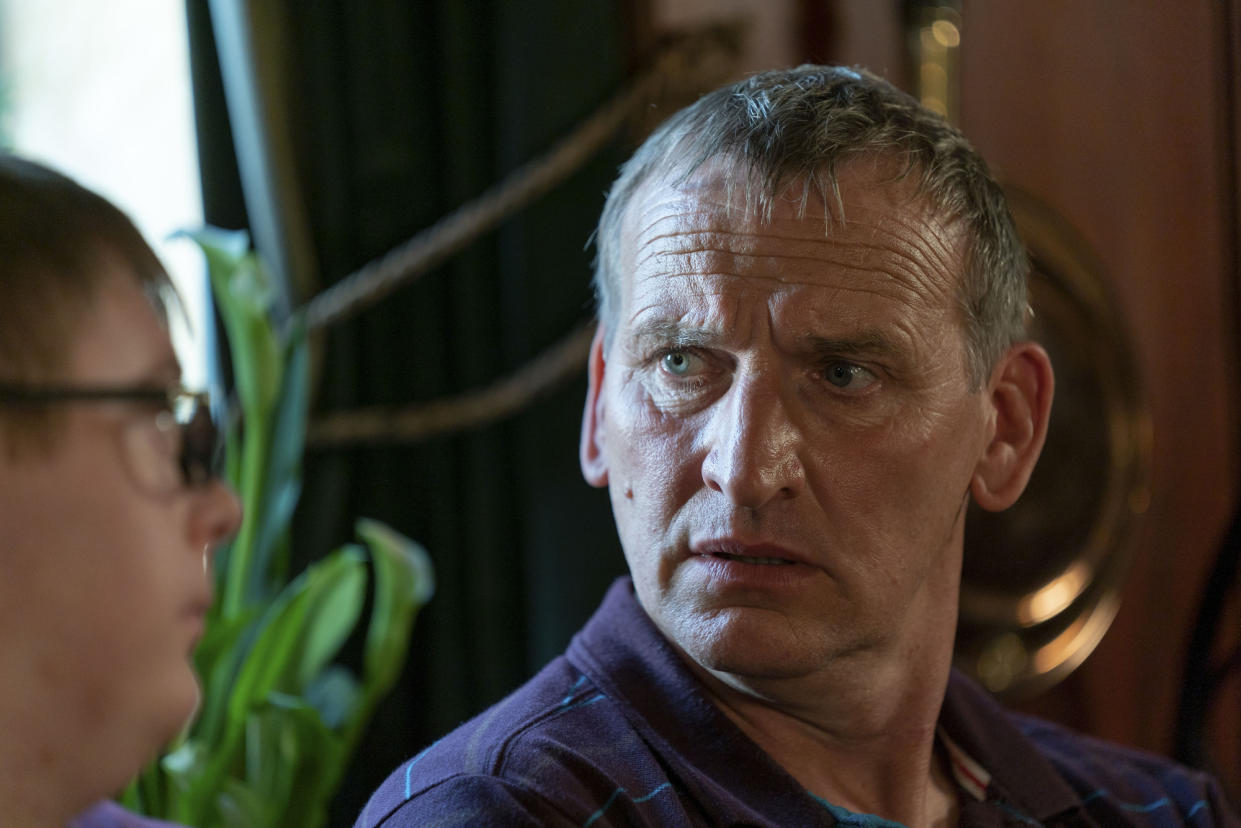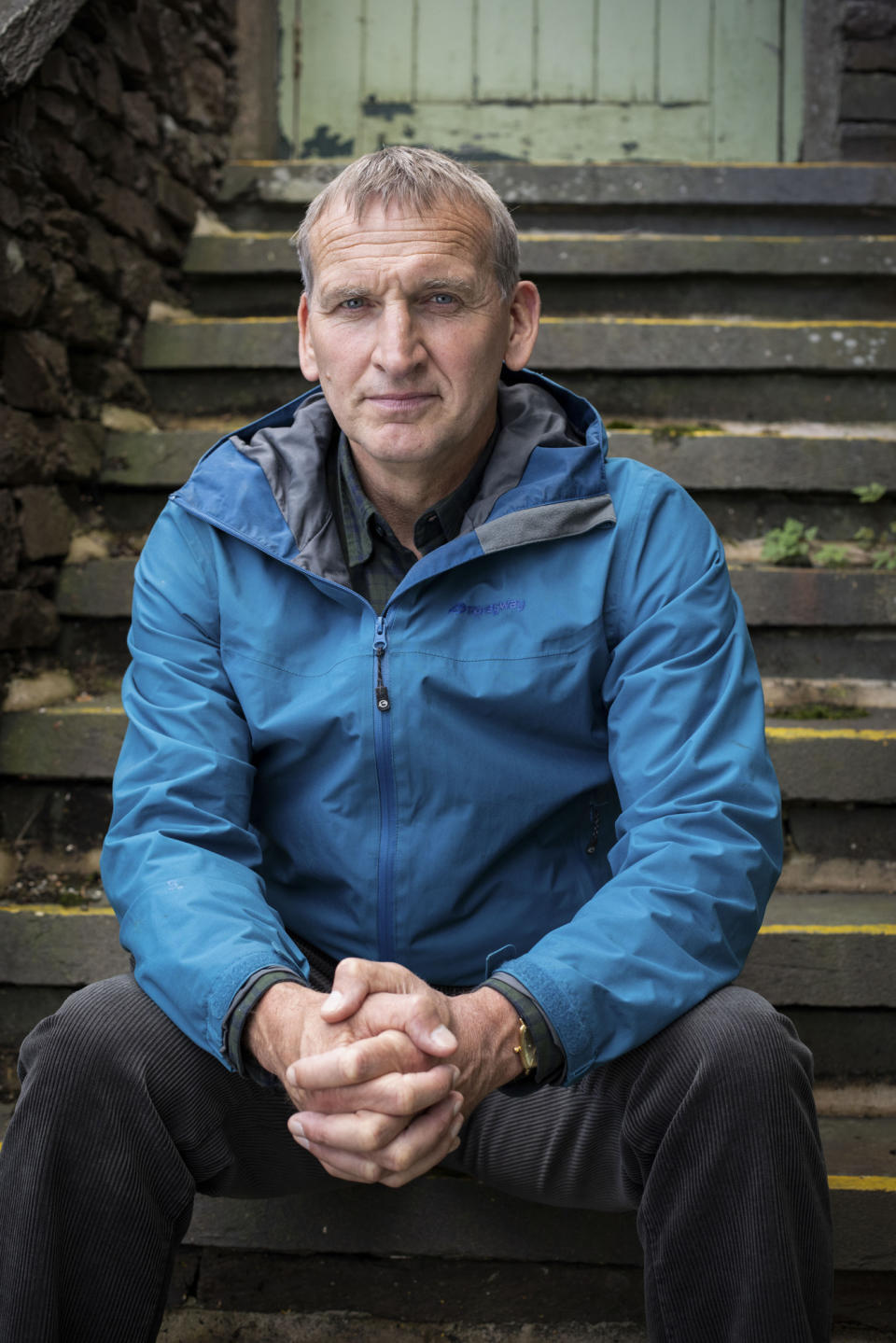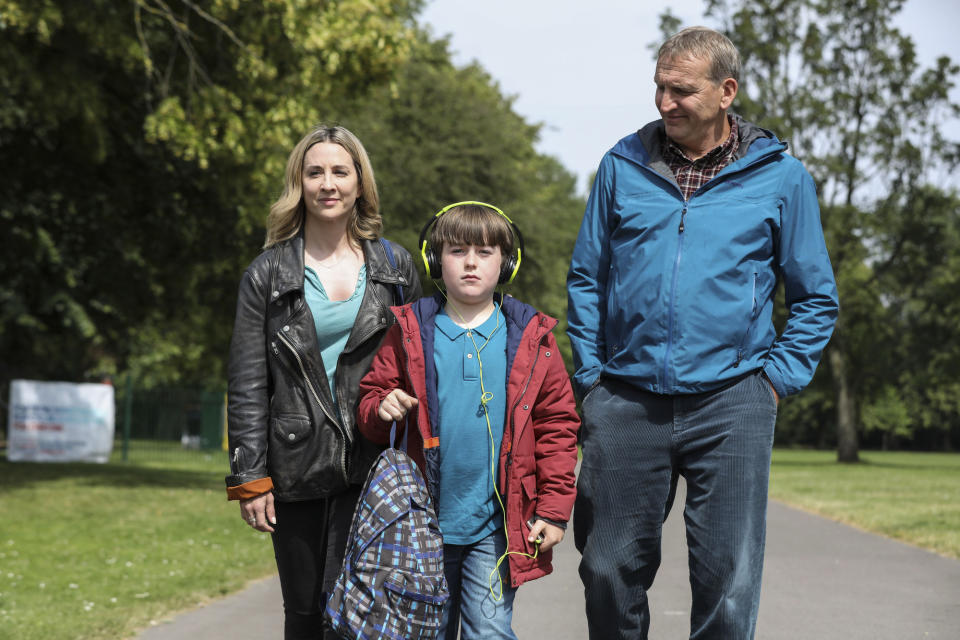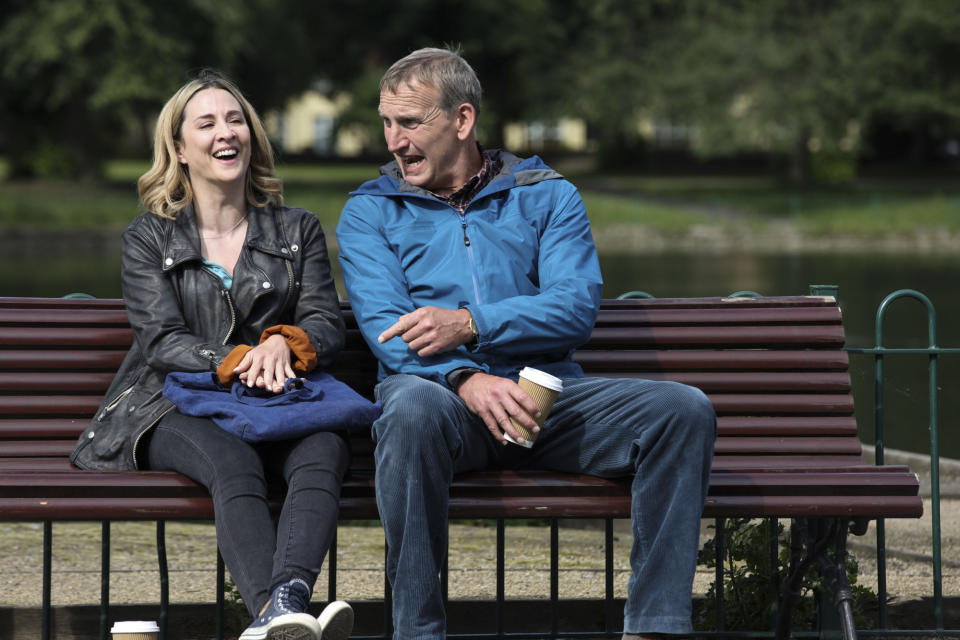'The A Word' interview: Christopher Eccleston can see the BBC drama running for years 'like Boyhood'

Ahead of the third series of The A Word, Christopher Eccleston explains why starring in the BBC family drama has been “a pleasure”.
The Doctor Who actor plays Maurice, grandfather to Joe, a seven-year-old boy with autism. “I think one of the virtues of the piece, certainly for audience members who have people in their family with autism, is that it’s been treated with humour and lightness,” the 56-year-old actor tells Yahoo.
He’s collaborating again with Peter Bowker, who previously wrote Flesh and Blood – a drama that Eccleston counts as a career highlight, alongside Hillsborough, Hearts and Minds, and Jude.
“I can find flaws in the performances,” explains Eccleston, “but in terms of playing the kind of roles I imagined for my career, those four were it. And I think probably they're my most successful roles.”
Of Bowker’s writing, Eccleston continues to say “there's great love in Pete for his characters: they're always three-dimensional, and he's both forgiving and unforgiving in his writing. I like to play characters who inhabit that grey area.”
Read more: Hollywood women share brilliant lockdown stunt video
Eccleston would like to keep returning to the role, too, “like that American film Boyhood. There's no doubt that the challenges for people living with autism deepen, I would say, as other lessons of puberty dawn.”
“But I would hope that perhaps we could look at that in a few years, when Max [Vento, who plays Joe] has moved into that age group.”
“Of course, by that point, Maurice, who has an existential crisis about his 60th birthday in the third series, God knows what we could do with Maurice as he approaches 70. I'd certainly like to do that.”
Read the full interview with Christopher Eccleston about how music shapes his performances, life in lockdown, and more…
This is your third year on The A Word – across 18 episodes, Maurice is now one of the characters you’ve played longest. When you’re approaching the third year of something like this, what sort of challenges does that present to you as an actor?

Well, I think there's an element of ease, because I've played him for a while, so I have a sense of what the writer wants me to do with the character. I don't really think about challenges, I just think about the pleasures of working with Pete Bowker's writing. Obviously, Maurice is a bit of a departure for me: a broader, more comedic role than I'm known for, and I've really enjoyed trying to learn and understand comedy, because it's a huge element in playing Maurice. I don't think I'm a naturally gifted comic, so I've had to work hard to understand how that works.
And I think one of the virtues of the piece, certainly for audience members who have people in their family with autism, is they've been grateful that it's not been treated in a very poker-faced, sanctimonious way, that we've normalised it with humour and lightness. It's just a pleasure. It's just a pleasure to have a job again, and a character that I love playing and a character that I've played for so long. No challenges, just all positives.
Peter Bowker has said that something he’d like to do with these characters is to keep checking in on them every few years, seeing how they develop and grow across a longer period of time. Is that something that you'd be interested in?
Yeah, like that American film Boyhood.
Yeah, exactly.

There's no doubt that the challenges for people living with autism deepen, I would say, as other lessons of puberty dawn. Obviously, Max [Vento], who plays Joe, is not there yet, so in this present series of The A Word we explore that a bit with the Travis character, who's playing a character on the spectrum, who is in adolescence. But I would hope that perhaps we could look at that in a few years, when Max has moved into that age group. Of course, by that point, Maurice, who has an existential crisis about his 60th birthday in the third series, God knows what we could do with Maurice as he approaches 70. I'd certainly like to do that.
Across your career, you’ve had roles in a couple of different programmes that featured neurodivergent characters, such as Let Him Have It and Flesh and Blood. Each piece obviously approached these themes from different angles, but required I suppose a similar sort of sensitivity to The A Word. Did those earlier roles inform how you approached The A Word at all?
Well, Derek Bentley [in Let Him Have It] was really my entry into the industry; I was incredibly lucky to get that role. Derek was diagnosed in the fifties, and the diagnosis techniques, as indeed the medication techniques, were very, very brutal and very, very limited. Derek, it was suggested, had a mental age of six, and that was it, and phrases such as “feeble-minded” and “mental” were still prevalent. Thankfully, we've moved on from all that. What I was conscious of in Let Him Have It was that I didn't want to idealise his learning disability and play a ‘holy fool’, for want of a better phrase. I didn't want either his class or his mental challenges to be idealised, softened. That's what I remember about that.

In Flesh and Blood, I didn't play a character with learning difficulties, I played a character who discovers that both his mother and father had learning disabilities. We had two actors who lived with learning disability playing major roles in Flesh and Blood, Peter Kirby, who played my father, and Dorothy Cockin, who played my mother. That was part of the BBC disability season of 2002, and the director and the writer felt it was very important, in the spirit of that, that we included people with mental disability in our drama. That was the same writer as The A Word, that was Pete Bowker.
Read more: Why Eccleston rejected Doctor Who return
So that opened my eyes, that was an introduction into that world and to being more inclusive in the workplace. Now, of course, we have Leon [Harrop] and Sarah [Gordy], actors who live with Down syndrome, and it's been an absolute joy. It's changed the way I approach my work, in a very positive way.
You’ve said before that the writer is the most important person in a drama, and often collaborate with writers you’ve worked with before: what is it about Peter’s writing that you connect with?

It's a little bit mysterious, isn't it? I think of why we like listening to our favourite artists. You can say broadly what it is, but there's a sense of familiarity. Pete is the same generation as me – he's a little bit older than me, not that you can tell! We were born within 20 miles of each other into a working-class background, so all our touchstones and formative influences are very, very similar, our approach to the industry is similar. I think we both feel like imposters, can't believe that we went from the council estate and are now acting and writing, which is quite unusual for our background. So we have that.
I think what draws me most of all to Pete's writing is his tragi-comic view of life. He will find great humour in the most tragic of circumstances, a little bit like Samuel Beckett. I feel like that's the only way forward. Fail, fail better. He seems to write from that perspective, Pete. There's great love in Pete for his characters: they're always three-dimensional, and he's both forgiving and unforgiving in his writing. I like to play characters who inhabit that grey area. Thomas Hardy said of Gabriel Oak in Far From the Madding Crowd, “on a good day, he's a good man, and on a bad day he's a bad man. He's a man of salt and pepper”. I think Pete writes that lovely.
I think you see that in Alison and Paul, particularly in series three, the way they deal with the divorce and they wrestle with their own egos and their self-interests while trying to put their child first and imagining how he feels. Pete doesn't sentimentalise his characters, but he doesn't damn them, either.
You've previously described Flesh and Blood as one of your four favourite roles. I was wondering what some of the other ones were across your career?

Joe in Flesh and Blood, Trevor Hicks in Hillsborough, Drew Mackenzie in Hearts and Minds… Those two written by Jimmy McGovern, Hearts and Minds and Hillsborough. And Jude in the Michael Winterbottom film. I can find flaws in all the performances, but in terms of playing the kind of roles I imagined for my career, those four were it. And I think probably they're my most successful roles.
Touching on that a bit, then: as an actor, how much of your performance would you say comes down to choices that you make in the moment
99% of them. I'm not an intellectual, never really particularly trusted my intellect. I've always relied much more on instinct and an emotional reaction. I think I make a lot of key decisions about how to play a role on the first reading of a script. I think that first reading prints a lot of things that I then try and fulfil later on. You're just reacting like the viewer would, you're reading it and imagining it for the first time. I think actors make a lot of decisions then. And obviously, then you'll calibrate and attempt some nuance during takes, but I'm instinctive.
I think you always find your performance in the other actors you're working with. I think the great attraction for me, and I'm feeling it particularly in the lockdown, is working with other people. Other actors, if you listen to them properly, often show you where your character should go. It's all about ensemble, and The A Word is a great ensemble drama. Nobody leads. We're telling a different character’s, or group of characters’, stories across each episode. I think Maurice leads the first episode, and then other people take over. I had that in The Leftovers, an ensemble cast where it's unpredictable, in the way that families and life is, where sometimes what's happening in one individual's life takes prominence.
In terms of what influences your performance, I wanted to ask in particular about music. In part because that’s something that’s quite key to The A Word anyway, but you’ve also because you’ve said that one of the first things that drew you to the script was a scene where Maurice sings a Gordon Lightfoot song. I was wondering then if music is something that’s important to your work generally?

Yeah, I use music all the time. When I was playing Hamlet, before I went onstage, I always played Town Called Malice by The Jam. When I played Macbeth, I always… I can't remember the song, but yeah, I use music. In my leisure time, in lockdown and pre-lockdown, if I have a night to myself, I won't have the television on, I'll have music on. I love black American music and Jamaican music; reggae and soul are really the mainstay of my life. Music alters my mood in a way that television and film can't, it's much more primary, direct way into me. And I read obsessively about music and I love music documentaries. I think I started to discover myself as a kid listening to music. Bob Dylan said a great thing when he said that he remembers hearing songs on the radio, and they made him feel like somebody else. I think there's something very true about that. Broadens and deepens your emotional life, having music hit you.
Read more: Eccleston reveals anorexia battle
I come to that from a very different place to Pete [Bowker]. One of the joys of The A Word for Pete is he can display his record collection, and he's much more of an indie man than I am. He’s far more interested in British indie music, whereas my influences are more black American. I did like the idea of singing the Gordon Lightfoot song because Maurice is 50 at the time, but he's still deeply romantic, sexually active, and we tend to forget that. We tend to think that romance and sex is all about your twenties and your thirties, but what's satisfying about playing Maurice and Louise [Pooky Quesnel] is they have a passionate love affair, and they're both approaching pensioner's age. So that's satisfying.
Did you use any music to get into character on The A Word particularly?
I always used to joke with the cast that I think Maurice is a secret 50 Cent fan.
Yeah, I can see that.
When he's in the shower, he plays P.I.M.P. and In Da Club. Yeah, I think Maurice is a closet 50 Cent fan. Pete Bowker, in series one, positioned him as a Blondie fan, which I can understand. I think Maurice says something like he'd like to drink Debbie Harry's bathwater. I don't know if that makes him a toxic male or not.
Maybe a little bit. I wanted to digress quickly, before the last question – this doesn’t really have anything to do with anything, but I was curious. You post a lot of pictures of yourself with flowers on your Instagram, which got me wondering – what’s your favourite flower?
My favourite flower... the bluebell, for my mother.
Oh, that’s nice.
Or, my favourite flowers are Esme and Albert, my son and daughter. So, I'll have Esme, Albert and bluebells, please.
How are they finding lockdown at the moment, if you don’t mind my asking?
They're fine, they're eight and six, and they are just carrying on with their childhood. Myself and their mother have obviously tried to normalise the experience as much as we can for them, and they're fine. They're fortunate, because they've got a back garden at their mum's and they've got a back garden at their dad's. They're very privileged kids, and I'm very privileged. Lockdown has not been a huge discomfort for me in any sense, or them. We're very lucky.
Finally then, just to bring everything to a close. What’s the most important thing you’d like someone to take away from your work?
I would like them to think I tried to show every aspect of the characters that I've played, and I'd like them to feel that they were watching a three-dimensional character.
Just on a personal note, that’s absolutely something I feel, watching Maurice.
Oh, well, thank you. Thanks, pal.
Christopher Eccleston, thank you very much!
The A Word returns to BBC One on 5th May at 9pm. It transmits weekly and all six episodes will also be available immediately on iPlayer.

 Yahoo Movies
Yahoo Movies 

